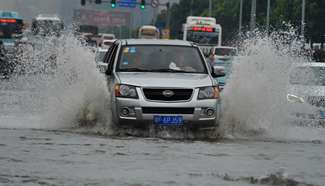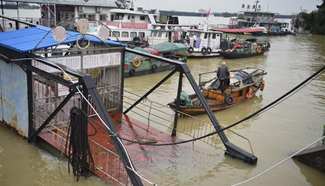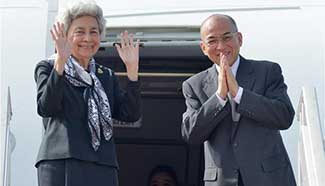
(Xinhua photo)
BEIJING, July 5 (Xinhua) -- The South China Sea used to be a peaceful region before the United States poked its nose into the area. Instead of its "Rebalance to the Asia-Pacific" strategy, what the United States really needs is to "rebalance" its attitude toward the issue.
Small frictions in the South China Sea date back to the late 1960s when some American scientists reported the discovery of rich gas and petrol resources in the region. Some coastal countries started to occupy the islands for that reason since then.
Fortunately, in the following years, China maintained overall peace in the waters via constant and friendly negotiations with concerned countries, and reached the Declaration on the Conduct (DOC) of Parties in the South China Sea with Association of Southeast Asian Nations (ASEAN) countries in 2002.
Taking no sides on the South China Sea issue was the U.S. position in the past.
However, the Obama administration launched the Rebalance to the Asia-Pacific strategy in 2009 and started to brazenly meddle in the area, which is far from U.S. shores.
In 2010, then U.S. Secretary of State Hillary Clinton said openly that her country "has a national interest" in the South China Sea. This May, Secretary of State John Kerry warned that China's action could create a "tinderbox" in the region, ignoring other countries' provocative actions a long time ago.
Freedom of navigation, respect for international law and strategic security are the terms most frequently used by the United States to disguise its private interests in the region.
The freedom of navigation in the South China Sea has never been a problem as nearly a hundred thousand boats freely sail across the waters every year, making up the majority of global maritime trade.
However, since 2015, U.S. warships and military aircraft have repeatedly approached the Nansha Islands without Chinese permission. This in fact reveals provocation and hegemony behind the U.S. claim of navigational freedom.
Calling for respect of international laws, the United States on the contrary hasn't ratified the United Nations Convention on the Law of the Sea (UNCLOS), the prestigious international treaty over the use of the world's oceans.
Outside the binding UNCLOS treaty, the United States secures the free movement of its maritime force by unilateral actions, which essentially violates smaller countries' sovereignties or interests.
The superpower claimed that its military presence in the South China Sea aims to protect its allies like Japan and the Philippines given the escalating tension in the region.
The regional tension, for which Washington blamed Beijing, has in fact been created by the United States itself.
Combining its China containment policy with the Rebalance to the Asia-Pacific strategy, the United States has deployed a large number of warships in the region and carried out joint military drills near the South China Sea.
The U.S. attitude of seeing China as the major challenger and impeding China's rise determines how it reacts to the South China Sea issue.
Clear-headed observers have seen through this.
What the United States is doing in the South China Sea reflects a dangerous "psychology of the empire," said the renowned American constitutional lawyer Bruce Fein.
The U.S. actions there by themselves will lead to no results, except for generating tensions and sending wrong signals to some Asian countries, Fein added.
U.S. support of the arbitration, unilaterally proposed by the Philippines, has contradicted Washington's position not to take sides on the South China Sea issue, said William Jones, Washington bureau chief of U.S. publication Executive Intelligence Review.
The United States should understand that it is only promoting regional conflicts to cover up its political interests under the guise of international law. To play a constructive role in the Asia-Pacific region, Washington needs to readjust its attitude.
Related:
Interview: U.S. has complicated South China Sea issue: Australian expert
BEIJING, July 4 (Xinhua) -- The United States has complicated the situation in the South China Sea instead of playing a constructive role, an Australian expert on maritime security has said.Full Story
SEOUL, July 1 (Xinhua) -- The Philippines has disregarded its legal duty in international law by unilaterally bringing the case of South China Sea dispute to The Hague, which has no jurisdiction over issues of territorial sovereignty, a South Korean law professor said.Full Story
Interview: U.S. should stop intervention in South China Sea issue: Sri Lankan official
COLOMBO, June 22 (Xinhua) -- The United States should stop intervention in the South China Sea issue to safeguard peace, stability and security in the region, Karunasena Hettiarachchi, Sri Lanka's secretary to the Ministry of Defence, said.Full Story











